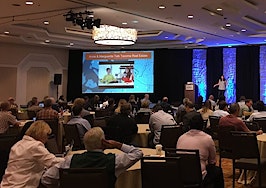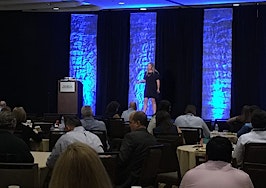- Some agents trust in the "ripple effect" of a smaller network, while others bet on making real connections with their online lead and referral clients.
- Many agents do both; your strategy should be dependent on your own strengths and weaknesses.
When real estate agents consider their marketing and lead-generation budgets every year, they have a couple of options: They can put their resources toward a few people they already know, or instead they can invest in connecting with many more people who are currently strangers to them.
In other words, as we asked in the article “Quality over quantity: How to turn your network into a renewable resource,” the central issue for new and seasoned agents alike is:
Should you spend the bulk of your time cultivating relationships with people already in your network, or should you try to cast as wide a net as possible by buying leads and referrals that don’t come with a personal connection?
Brad Inman posted this question on Inman Coast to Coast, and the responses were enthusiastic — and varied. Here’s a selection:
Believe in ‘the ripple effect’
“I’ve always been a big believer in the ripple effect,” said Sean Carpenter, a Realtor in Columbus, Ohio. “It’s better to know a lot about five people than nothing about 500.”
“If you were to ask 10 people for business 10 times, you will have better results than asking 100 people just once,” said Valerie Garcia, a consultant based in Mississauga, Ontario.
“Not keeping track of the people you already know will cost you more than whatever you might gain from spreading yourself too thin and not staying in proper contact with your existing sphere of influence,” added Michael McClure, a broker in Plymouth, Michigan.
Fullerton, California-based Erica Boisvert suggests a mix, leaning more toward your existing network — but not neglecting newbies, either.
“Seventy-five percent of time concentrate your efforts on people you know, stay connected, stay top of mind, be of service, be human,” she coached. “Twenty-five percent of the time reach out to new people, build connections and continue growing your sphere. Move the 25 percent into the 75 percent. Rinse and repeat.”
Rosemary Buerger of Cameron, North Carolina, put it like this: “I am a relationship builder. It doesn’t mean that I’m going to go sit down to dinner with them once a month, or be their best friend. I am building a lifelong relationship with repeat clients.”
Buerger says she doesn’t buy leads or referrals, “and I still manage to stay afloat with the business that my sphere sends me. I’m not saying transactional business is bad, it happens, but it’s not what has sustained me for the nine years I’ve been in this business.”
‘Online leads are people, too’
Minneapolis agent Danny Dietl takes exception to the concept of “buying leads.”
“As if those people can’t become friends, awesome clients and refer business,” he pointed out. “I’d rather step into oncoming traffic than go to a networking event, but I’ll take Zillow calls all day long.”
Shannon Harrington in Charlottesville, Virginia, agrees. “There is such a value judgement around folks that contact from the world wide web,” she noted. “No wonder some agents’ conversion rates suck and they are disappointed.
“I have made really nice connections from folks who found me on third-party sites, so I also refute this idea that they are people who are cheap and unworthy of attention,” she added. “In my mind, they are individuals who have already shown interest in my services and the process.”
‘The answer is: Yes’
“The answer is simply, ‘yes,'” opined Chris Speicher of Olney, Maryland.
“Yes,” added consultant Kenneth Jenny.
“Why does one exclude the other?” asked Bill Lublin from Philadelphia, Pennsylvania. “Strangers are often just friends you haven’t met yet.”
Tempe, Arizona-based Kevin Kauffman said that “both/and” have been successful for him.
“I don’t understand why you wouldn’t pay attention to both” if your goal is to maximize your business, he said.
‘It depends’
Think about your end goal before you decide which tactic to follow, suggested Tracy Freeman, a broker in Maplewood, New Jersey. “If you want big results, you have to have a wide net and play the numbers game,” she said — and you probably also want to team up with other people working with you.
“If you want smaller (perfectly acceptable) goals, as an individual, you work a smaller network by yourself,” she added.
Kim Basco from Lambertville, New Jersey, noted that everyone’s preferences (and success recipes) are going to be different.
“If you are a networker who nurtures a large sphere and would ignore your texts for a 90-minute lunch with a referral source … then Zillow leads are not your best option for lead generation,” she explained.
“If the idea of joining a chamber or a business group or BNI makes you cringe, and you are oriented towards tech … then playing the Zillow numbers game might be for you.
“I have an agent who attributes $6 million a year on a direct mail program. She’s never answered a Zillow inquiry, or attended a meet-and-greet network event in 10 years,” Basco added.
“Some people are simply not referrers by nature,” noted Leslie Ebersole, a team lead in Chicago. “Too many agents — especially the ones who don’t survive — fall into the trap of thinking that delivering great service will set them up for life with a steady stream of referrals.”
But if the people in their network or sphere aren’t natural referrers, “it doesn’t work out as they expected,” she added.
According to the “jelly bean jar method of running a repeat and referral business,” she explained, “you can keep a certain number of people in your jelly bean jar — from 150 to 250.” But the people in the jar all must meet these three criteria:
- They know, like and trust you
- They are referrers by nature
- They have a large social network
“Too many people in the real estate industry make the assumption that everyone wants personal relationships with people they do business with,” Ebersole continued. “But not everyone works well with personal connections.
“Many people don’t want their personal life, especially finances, exposed to friends and family, so they choose competent service professionals that are outside their sphere,” she said.








